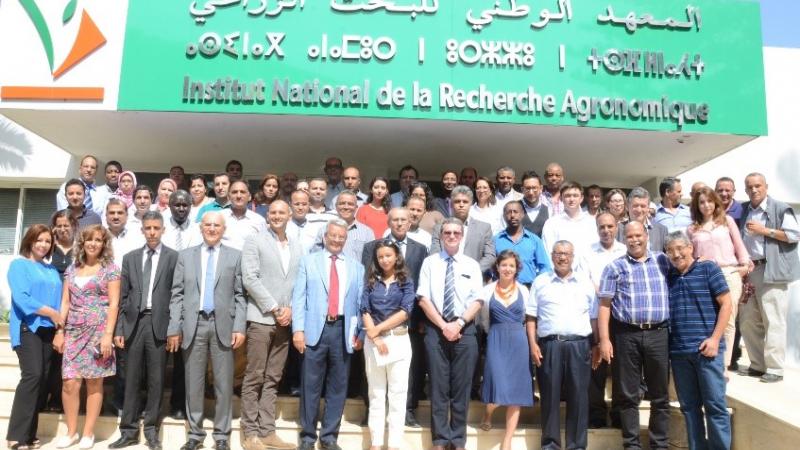Gap analysis of Morocco’s seed sector and technology adoption to help improve uptake
Published Date
October 13, 2016

Workshop on Adoption, Impact and Seed System of Wheat in Morocco
The results of an important study completed in Morocco on the state and gaps in adoption of improved wheat varieties, and an analysis of its seed system were recently presented at a national workshop in Rabat. The study, a joint project of INRA, ONSSA, SONACOS, MAPM and ICARDA, was commissioned to increase the effectiveness and impact of wheat research through more effective targeting of improved technologies. The findings and recommendations from the project were shared with key public and private stakeholders in Morocco’s wheat sector invited to the workshop, held at INRA’s headquarters in Rabat on September 8, 2016.
The workshop was chaired by Mr. Ahmed Ouayach, the president of FNIS (National Federation for Seeds), a newly formed organization responsible for the s eed sector, and the president of COMADOR (Federation of Moroccan Inter-professions for Rural Development).
“Meeting the targeted plan of seed production and marketing is a priority for the country and fully supported by the Government under the Green Morocco Plan (GMP), along with the roles played by INRA and other gathered key stakeholders from both the public and private sectors,” stated Mr. Ouayach in his opening remarks.
Prof. Mohammed Badraoui, Director General of INRA, added, “INRA, along with its international partners including ICARDA and CIMMYT, has been and will continue to play an important role in the seed production effort for national agricultural development of the country and to support the Green Morocco Plan.”
The results of the study, documented in a comprehensive report, provide well-grounded calculations of adoption levels and impacts, and identifies the most important factors that enhance or hinder the wider adoption of wheat technologies. The report offers thorough analysis of the wheat seed sector performance, and identifies systemic bottlenecks and opportunities that need to be addressed to unleash the potential of improved wheat technologies on national food security and livelihoods of farmers.
“The findings from the study provide a firm direction for ICARDA’s continued support to the national systems in improving yields of farmers,” expressed Dr. Andrew Noble, ICARDA’s Deputy Director General for Research. Seed delivery systems are a major constraint for the uptake of the new varieties and genetic gain by farmers in many countries of the region.
The study was part of a series of research undertakings within the CGIAR Research Program on Wheat and the Wheat-Legume Cropping Systems project in West Asia and North Africa, funded by the EU and IFAD.
For wheat research to achieve large-scale impacts on food security and poverty reduction, adoption of improved varieties and associated technologies and innovations should be achieved at scale. A robust national seed system which makes available adequate quantities of high quality seed at the right place and time and at an affordable price is essential. Given the long history of national and international agricultural research and the boost from the GMP, strengthening the seed sector is a logical national priority.
The stakeholders’ discussions at the workshop led to key recommendations for the improvement of the effectiveness of the whole wheat sector and seed sector, in particular, with emphasis on the main components, including variety development, release, maintenance and licensing, as well as seed production, commercialization and quality assurance.
As next steps, a national taskforce made up of key stakeholders has been suggested to follow up on implementation of the recommendations from the study and for policy advocacy.
“The rigor of the study in developing the recommendations puts Morocco on a firm path for improving its seed systems and achieving its national goals in the coming years,” noted Dr. Noble.
